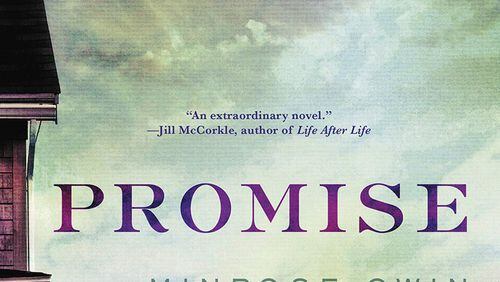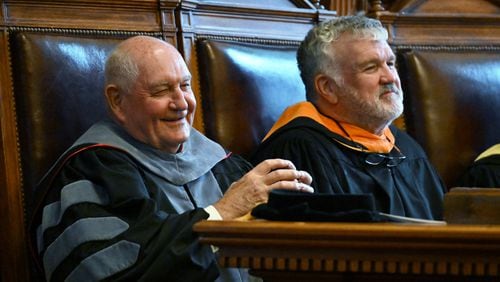“Promise” is a historical fiction based on the fourth most deadly tornado in the history of the United States, which tore through Tupelo, Mississippi, on the evening of Palm Sunday in 1936. The tale begins an hour before the F5 twister hit and continues sequentially for the next five nightmarish days, chronicling the fictional stories of two people whose lives were uprooted by the natural disaster: Jo McNabb, a white teenage girl, and Dovey Grand’hommes, a black great-grandmother.
Author Minrose Gwin’s timeline structure spans the cyclone’s immediate aftermath, allowing the reader to soak in the kind of excruciating circumstances people experienced more than 80 years ago. The massive funnel cloud, with winds estimated at up to 318 miles per hour, leveled 48 city blocks and sent townspeople, animals and debris flying every which way. The author, a Tupelo native, grew up hearing haunting truths and lore about the disaster; her own grandmother found a dead baby girl in a crepe myrtle bush. Gwin learned that a family of 13 perished, that featherless chickens walked the streets and that an 8-year-old girl landed a mile away, unhurt, in another family’s home.
The story that went unrecounted, however, angered Gwin when she discovered it in recent years. African-Americans – one-third of the town’s population – were not included in the official casualty records, which clocked the death toll between 216 and 233 people. The novel uses fictitious characters alongside actual newspaper accounts, oral narratives and memorabilia to “tread where history … has been made too tidy,” the author’s note explains. The premise and setup is similar to another new book, Anthony Grooms’ “The Vain Conversation,” which pens a fictionalized account of a gruesome mass lynching in Georgia.
“Promise” is told through the alternating perspectives of Dovey and Jo, whose families’ lives were distinctly separate but intertwined before the storm hit. The ominous weather is foreshadowed by Dovey’s observation in the book’s four-word opening line: “Too still out there.” But the author takes a gloriously long time, through descriptive character-developing tangents, to get to where the sky cracks open “like a giant egg” just after 9 p.m. The time of day is denoted each time the viewpoint changes. At 9:32 p.m., Dovey is climbing out of the pond she was blown into. A chapter later, at 10:17 p.m., Jo is awaking to her mother’s screams at home.
Occasional reprieves from the tornado’s intense devastation are offered in the form of flashbacks, though many of the memories are equally as brutal. Dovey, a laundress who did the McNabb family’s dirty laundry, has a deep-seated hatred for the family because Jo’s older brother raped and impregnated her mixed-race granddaughter, Dreama. Dreama’s son, Promise, is so pale that strangers mistake him for white. Jo similarly distrusts her brother for the unforgivable things he’s done to her, but she doesn’t realize just how dysfunctional her family is until the storm changes everything.
The tornado leaves Jo’s older brother dead, her depressed mother without a leg, her distraught father on the lam and her infant brother, Tommy, missing. It separates Dovey from her husband, Dreama and Promise. Dovey, with an injured foot and head, and Jo, with a shard of glass in her forehead in addition to a previously broken arm, are on missions to take care of their respective families. The fiercely protective women meet briefly during the early-morning hours after the tornado when Dovey seeks shelter from the cold at the McNabbs’ house and falls asleep between Jo and her mom. “It was the closest Dovey had ever been to white people; she could feel their body heat against her shoulders and upper arms.”
After Dovey leaves, Jo hears a baby boy coughing in a crepe myrtle bush outside her damaged house. She rescues him and assumes the role of caretaker, thrilled to have a second shot at being a good sister as she grapples with the “peculiar circumstances” surrounding the death of her other brother. She and Dovey wander around the wrecked town on different paths for days afterwards, though they are never too far from each other, as shown by the author’s clever use of timing that makes it possible for readers to follow one of them walking out of a building right before the other enters.
Dovey puts her energy into finding her family, encountering unbridled racism at virtually every turn. She’s almost killed when a man shoots at her for trespassing, and her search is impeded by Jim Crow era segregation, which extends beyond the grave when a nurse tells her, “The paper’s running lists of the deceased, but only the white folks. Ain’t bothered to count our people.” Jo notices the absence of documentation, too. “It was as if the people who had made the households and yards and barnyards hum all over town had vanished from the face of the earth without a trace.”
As the days drag on, hunger, pain and fatigue increase as the hope of finding loved ones alive diminishes. When the story takes a twist, which is shocking for a moment before it makes total sense, Jo decides she must leave her parents behind and is drawn like a magnet to Dovey for help. “Promise” is innately worth reading because it involves a gripping true story that emphasizes a terribly dark time in America’s history, but the inspired, thoughtful and beautiful writing takes it to another level.
FICTION
‘Promise’
By Minrose Gwin
William Morrow/Harper Collins
400 pages, $25.99
About the Author






